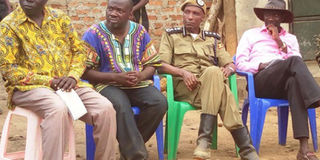Night attacks: Households to pay Shs1,000 for security

Left to right: Bukomansimbi RDC Kityo Mukasa, District chairman Muhammad Katerega, Inspector General of Police Kale Kayihura and Lwengo District chairperson George Mutaabazi listen to residents in a security meeting recently. PHOTO BY CHRISTOPHER KISEKKA
BUKOMANSIMBI- Frustrated by the wave of night attacks by machete-wielding assailants, residents in Bukomansimbi District have resorted to forming vigilante groups to guard themselves at night.
According to local leaders, the groups, which will comprise mainly the youth, will work alongside police to keep watch and ensure security at night.
However, this will come at a fee as every household will be required to pay Shs1,000 every month.
Mr Kityo Mukasa, the Bukomansimbi Resident District Commissioner, who is also the head of security, explains that the decision to form vigilante groups was made by residents during a security meeting which was convened last week.
“This wasn’t our resolution; it was brought forward by village leaders and residents who realised that it was a good idea in guaranteeing their security. We also bought the idea because the police is currently thin on the ground,” Mr Kityo said during an interview last weekend.
On the New Year’s Day, unknown assailants descended on four villages of Bukomansimbi and Lwengo districts, killing four people including a retired senior police officer, Dennis Ssebugwawo. The attacks also left 11 others injured.
Similar attacks have been experienced in other districts in Masaka Sub-region in the last couple of years.
Victims of the attacks say a gang numbering about 10 men and armed with crude weapons such as pangas (machetes), axes, iron bars and clubs, attacked the villages; hacked and clobbered the residents in the middle of the night.
There are also reports from survivors that the thugs are raping women they get in the houses, although the victims are shy to report the incidents.
According to Mr Muhammad Kateregga, the Bukomansimbi District chairperson, the money that the residents will pay will buy overcoats and torches among other items which will be used during night patrols as well as paying some allowance to the vigilantes.
“The initiative is very good and may bring everlasting peace in the district if it is fully supported by our people,” Mr Kateregga notes.
He adds that the district and the sub-counties are also planning to commit a small portion of their budgets to facilitate the vigilantes since this concerns lives of all residents.
Mixed reactions
However, the initiative of paying for security has since generated mixed reactions among residents with some opposing it.
Mr Muhammad Musa Kigongo, the councillor representing Kibinge Sub-County, is of the view that although the initiative seems to be good and welcomed by a number of residents, there is need to look into its implications.
“It would have been good if the District Council had sat and discussed the matter. We need a by-law stipulating the mode of collecting such money, to whom it will be given among other critical things,” Mr Kigongo states.
Another resident, Mr Mark Mukasa, says security is one of the sectors that are well-funded and if its current budget is not enough, then somebody must be held responsible.
“The government is relegating all its responsibilities to the public. We are paying money to access services in public hospitals and schools and now they want us to pay for security. It is quite absurd,” Mr Mukasa laments.
Mr Latin Zaake, the regional police commander, says the initiative of paying money for community security teams is not in any way connected to police.
“As police, we have laid down our strategies basing on sub-county levels and the said initiative has been started is by residents and their leaders as one way of supporting police,” Mr Zaake clarifies.
Mr Zaake explains that among the measures drawn to fight insecurity in the area is to give each sub-county two motorcycles which will be used to patrol villages.
However, there are fears that police may fail to provide fuel to sustain them.
Mr zaake adds that the police have also launched a call centre at sub-county level with two toll free numbers manned by operators 24 hours.
When night attacks on residents’ homes were first reported in Bukomansimbi early last year, Mr Zaake, who had just been appointed to his current position, pitched-camped in Bukomansimbi for two months and formed a joint security team comprising the police, the Flying Squad, and the Uganda People’s Defence Forces from Kasijjagirwa Barracks.
But when the security personal withdrew from the area, the attackers resumed their heinous acts.



